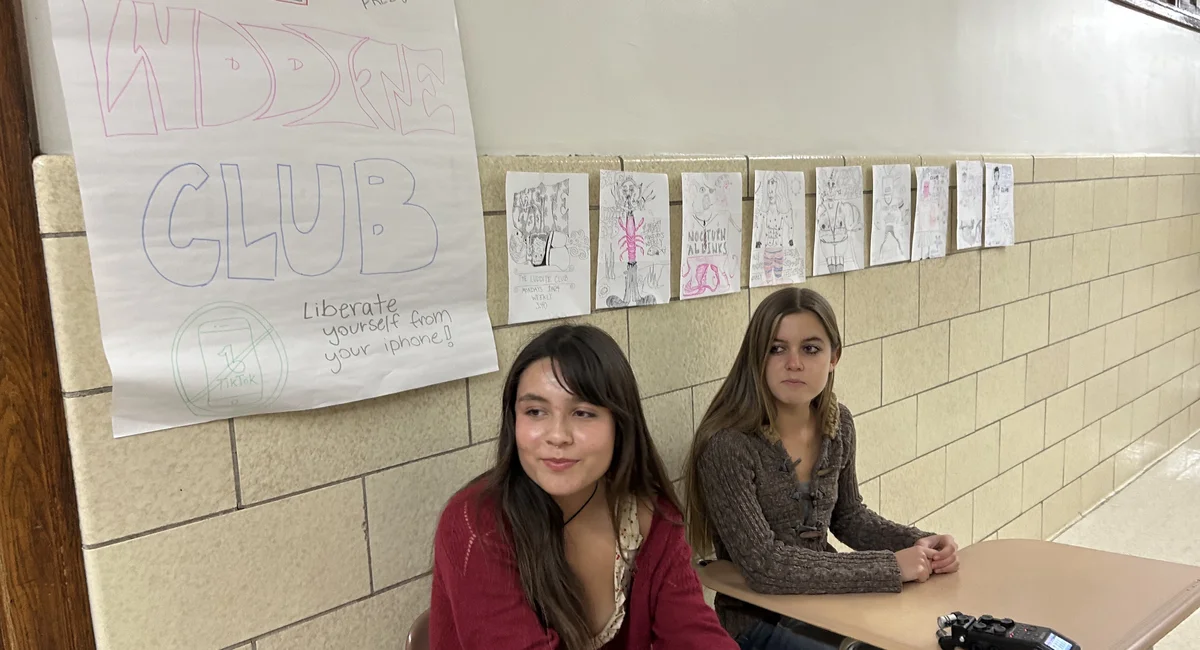
Un étudiant Luddite Club et un programme «ambassadeur» enseignant aux parents les dangers des médias sociaux mettent en évidence une tendance croissante chez les enfants.
As Mayor Eric Adams weighs a smartphone ban in New York City public schools, a growing number of students are evangelizing a low-tech lifestyle.
Last week, members of a Luddite club tried to entice new members at a Brooklyn Tech fair, touting the real-life activities they do at meetings while their phones are stashed away.
Jameson Butler, a 17-year-old senior, showed off collaborative drawings club members recently made playing a Surrealist parlor game called exquisite corpse.
“Are you addicted to your phone? Do you like to have fun? Join the Luddite club!” Butler called to students.
But finding new members wasn’t easy. Many students walked by the table without giving a glance to the club’s poster with messages reading, “The truth will set you free” and “Liberate yourself from your iPhone.”
Butler and her friends named the club after the 19th century textile workers who smashed machinery because it threatened their jobs. The student club is more pacifist. At gatherings, club members talk about books, make art, play cards and sing songs. Some have renounced smartphones altogether and carry flip phones. Others just like to carve out a couple hours a week without social media.
“I think it’s unhealthy how dependent a lot of us are on our screens, especially kids,” Butler, who co-founded the club with a friend several years ago, said. “Their attention spans are just deteriorating. You can do anything you want if you put your mind to it — but you can only put your mind to it if you have an attention span.”
The high school students in a Luddite club are taking a more pacifist approach than 19th century Luddites, who destroyed agricultural machinery threatening their jobs.Photo 12/Universal Images Group via Getty Images
Butler and her fellow Luddites had anticipated a breakthrough for their movement this school year. Over the summer, then-Schools Chancellor David Banks had said a ban on phones in public schools was imminent. But then Adams reversed course, saying he needed more time to work out the logistics and respond to concerns from parents and staff.
Education department officials said they are using this year to talk to students, parents and staff about a potential ban. Nearly 900 of the 1,600 public schools have restrictions or will impose some this year. The plan, officials said, is to evaluate how the bans are working in order to chart a course forward. Adams said he would be reviewing schools’ experiences with phone lockers versus secure pouches, and weighing concerns from parents about contacting their kids in an emergency.
In the meantime, student-led groups are building up the smartphone resistance.
Last week, three high school “ambassadors” gave a presentation about the dangers of social media to elementary school parents at P.S. 11 in Chelsea.
Gemma Graham, a 17-year-old senior at West End Secondary School, shared the experiences she and her classmates have had with cyberbullying, and told parents she wanted to prevent young people from getting “trapped in the black hole” of social media.
A parent, Tara Murphy, described the moment she realized there are hardly any safe spaces on the internet. She recalled when her 9-year-old daughter, who likes chess, tried watching a game online. The comments were full of vulgar language.
“I’m like, nope, we’re out. I cannot just leave her on even a site that seems innocuous like chess,” Murphy said.
Students suggested parents consider giving their kids lower-tech alternatives to smartphones, like flip phones or smart watches. They fielded questions on how to prevent kids from overriding screen time limits and other parental controls.
Student Gemma Graham delivered a presentation on phone addiction and the dangers of social media to parents at P.S. 11.Jessica Gould
Thomas Loeb-Lojko, also a 17-year-old senior at West End Secondary School, said he noticed that even young children get addicted to screens.
“When it gets taken away from them, they’re prone to throw a tantrum. The screen can kind of burn them out of having any sort of energy to do anything,” he said.
Megan Kiefer, trained the new teen ambassadors through her nonprofit, Take Two Media Initiative. She said she was inspired by previous generations of students who led campaigns to curb smoking and promote recycling.
“I got to the point where I was like, ‘I think we’ve had enough adults talking about this,’” she said. “How amazing would it be if we could train young people to be the voice for their generation and be the advocates for this?”
She said the goal is to train enough students so that they can visit schools across the city – making similar presentations to parents and kids.
Meanwhile, the Luddite club has spread to multiple schools. Following news coverage, more kids have started coming to Sunday meetings outside the Brooklyn Public Library, and there’s a documentary about their movement in the works.
But Butler said many kids still have their eyes glued to their phones. As they tabled for new members last week, it seemed many students didn’t even register that the Luddites were there at all.
“Right now we’re just in need of a wellness revolution against technology,” Butler said.




